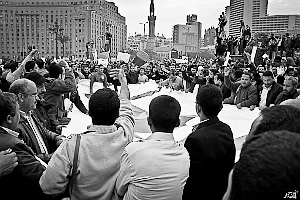Editorial
New hopes
I have a dream... – Martin Luther King Jr.
That is both the beginning and the title of one of Dr King's most famous speeches, which he gave in 1963 and is considered one of the inspirations behind the nonviolent revolution by the black population of the United States. Today, almost fifty years later, his words seemed to resonate elsewhere, in a year in which the first two months have given us some hopeful news.

Photo: Ahmad Hammoud
First, on 10 January, there was the latest communiqué by ETA, which was in itself insufficient and highlighted internal debates. However, it followed the GRIT strategy of unilateral steps, and was in broad agreement with the demands by the international group headed by Brian Currin. A little later, ETA's political counterparts presented the statutes for a new political group that clearly stated that its rejection of violence was explicit, unilateral and the irrevocable. This has created an optimistic scenario, which Pedro Ibarra examines in Platform.
Second, and almost simultaneously, an uprising began in Tunisia after an increase in the price of basic foodstuffs. It was not the first time this had happened, but on this occasion the consequences were unforeseeable. A few days later, the Tunisian president was forced to resign by popular pressure, which continued until the prime minister also resigned. Other countries in the Arab and Islamic world have also been shaken by popular uprisings with an obvious domino effect - Egypt, Yemen, Bahrain, Libya, Oman, opposition movements in Iran... the list is incomplete, as the snowball effect is still in action. Some people have already christened 2011 as the year of uprisings. These events have also coincided with this issue dedicated to nonviolence, and in our In depth section Rafael Grasa's article examines these events from the perspective of nonviolence, given the important role played by nonviolent civil disobedience in these processes of change, with the exception of Libya.
In our In depth section, we have also attempted to provide an overview of the various aspects of nonviolence: from its theory and history to its implementation. The articles by Jaume Botey, Pere Ortega, Luca Gervasoni and Carlos Pérez provide us with an perspective on nonviolent thought and action, from the perspective of the Catalan tradition and from the theoretical and practical viewpoint. In Platform we have an article by Xavier Alcalde that reminds us of the pacifist roots of the universal language: Esperanto.
Nonetheless, hope does not blind us to persistent problems, such as military expenditure, the securitisation of development and the increasing importance of the privatisation of security. Or harrowing events which continue to fester due to the incapacity of those directly involved and the international community, such as the situation in Côte d'Ivoire, where the post-electoral impasse continues, with ongoing violence and a series of unsuccessful mediation missions, which is making governability and everyday life in particular very difficult. Meanwhile, the Palestinian-Israeli conflict remains in a dead end, and in this context, the uprisings in the Arab world appear to reinforce trend towards stagnation. No significant improvements can be glimpsed in Colombia, despite the expectations in early 2011 also being very optimistic, or in Afghanistan.
In short, the international landscape is uncertain and at the same time exciting. It remains to be seen in which direction the winds of change and peace will blow over the next few months.